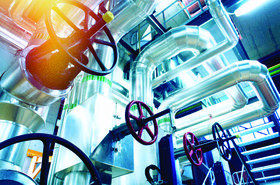The European Data Centre Association (EUDCA) – an organization representing Europe’s colocation data center community – welcomes the efforts of all policymakers to reduce emissions that are harmful to the environment and reduce, if not halt, the advance of global warming and its effects. This applies to the phasing out of fluorinated greenhouse gases (F-Gases).
Europe’s data center industry has acted quickly and decisively in support of net zero goals through initiatives such as co-founding and launching the Climate Neutral Data Centre Pact (CNDCP). Measuring, managing, and reducing Scope 1, 2, and 3 type emissions is a key element of achieving climate neutrality.
When it comes to F-Gases - which represent Scope 1 emissions that can be impactful due to the high Global Warming Potential (GWP) of many of these chemicals - the EUDCA also believes that a realistic phase-out of climate-impactful substances is required.
Originally adopted by the EU in 2006, the F-Gas Regulation was strengthened in 2015 by measures based on the successful phase-out of ozone-depleting substances, achieved 10 years ahead of schedule. With the new rules entering into force in the near future, the EU has stepped up its ambitions, with plans to completely phase out the production of climate-impacting F-Gases by 2050.
The new rules include limiting the total amount of the most important F-Gases (HFCs) that can be sold in the EU; banning the use of F-Gases in many new types of equipment where less harmful alternatives are widely available; and preventing emissions of F-Gases from existing equipment by requiring checks, proper servicing, and recovery of the gases at the end of the equipment's life.
What are F-Gases and why the ban?
F-Gas – or fluorinated gas – is a term applied to a range of synthetic gases containing fluoride which are used in a wide range of industrial applications. They have been developed as efficient refrigerants and effective coolants. They also perform well in fire suppression applications, offer good insulation, and are flame resistant.
In the data center industry, as in many other energy-intensive industries, F-Gases are pervasive. They are currently critical for the safe, reliable, and energy-efficient functioning of a range of equipment including HV & MV electrical switchgear (SF6), cooling (HFC refrigerants), and fire suppression systems (HFC gas and foams). The term applies to:
- Hydrofluorocarbons (HFCs): present in a multitude of applications such as refrigerants, blowing agents for fire fighting foams, and solvents.
- Perfluorocarbons (PFCs): widely used in electronics, cosmetics, and the pharmaceutical industry.
- Sulfur hexafluoride (SF6): applied for arc suppression and insulation in medium voltage (MV) and high-voltage (HV) switchgears.
- Nitrogen trifluoride (NF3): mostly present in microelectronics.
The inherent environmental Achilles' heel of F-Gases is that they are greenhouse gases. Some exhibit exceptionally high Global Warming Potential (GWP) - a term used to describe their relative potency as well as how long they remain active in the atmosphere.
What are the short-term implications of the F-gas ban?
Focusing on the implications for switchgear alone (we will deal with cooling at a later date), the EUDCA congratulates the EU on a staged approach that we feel is balanced. Existing switchgear can still be used until the equipment’s end of lifetime; however, it cannot be serviced or maintained with SF6 from 1 January 2035.
The possibilities for purchasing switchgear relying on an insulating or breaking medium with a GWP >1000 will also be limited. Even though F-Gas-free switchgear alternatives are becoming more available on the market, policymakers acknowledge that they might not be in sufficient quantities. The regulation therefore permits a phased programme to help develop a new, competitive supply market.
The regulations are smart as they match the potential scope 3 emissions and market inefficiencies created by too aggressive a policy, while sending a clear signal to the market that future designs and upgrades must adopt F-Gas free solutions.
Long term challenges for F-Gas-free switchgear
Existing switchgear can be used to its theoretical end of life or 2035 – whichever is sooner. However, many EUDCA member operators are already taking steps from monitoring the supply chain and meeting with manufacturers to assess how and when new products are being brought to market, to using the new regulations as an inflection point to update switchgear across all their data center stock with new and F-Gas free switchgear.
Maintenance, upkeep, and monitoring become an increasingly important issue, especially in regard to F-Gas leak detection and prevention. This will drive the natural evolution of the overall design and operations of data centers.
While the phase-out of high GWP F-Gases is an essential step in reducing environmental impact, it also presents some challenges for legacy data centers. A too-rapid phase-out could affect the efficiency and safety of existing data centers upon which the entire European telecommunication, Internet, and cloud technology depend. Safety emerges as the central pivot during this transition. Data center operators must forge strong collaborations with equipment manufacturers, standing as guardians of stringent safety protocols. In this journey, certification and quality assurance stand as watchmen, guarding the path to compliance.
Finally, the overall environmental impact of the transition, especially the embedded carbon in new equipment and construction work required to remove and replace old equipment means the transition isn't just about compliance, it is also about securing a legacy of sustainable innovation.
Conclusion
The EU’s approach to the restriction of F-Gases is welcomed as it ensures an adequate balance between ambitious but gradual phase-out targets, whilst ensuring that such restrictions do not undermine data centers’ safe reliable operation and comprehensive sustainability scope or digital potential.
However, to achieve this delicate balance, sufficient investment is needed in the coming years to both increase the recycling and reclaiming capacity of existing F-Gases and support the development and availability on the market of safe, reliable, and efficient alternatives that comply with current and upcoming restrictions.
The EUDCA will continue to review and publish information covering the new F-Gases legislation. We will do this by working with our members, other trade associations, vendors, and regulators. This collaborative approach will be instrumental in navigating the evolving landscape of F-Gas regulations, ensuring compliance, and contributing to a greener and more sustainable future.
Steven Parker of Global Switch and Alessandro Zerbetto of Vertiv, both members of the EUDCA Technical Committee, contributed to this piece.






